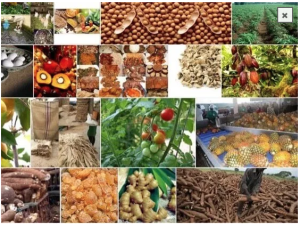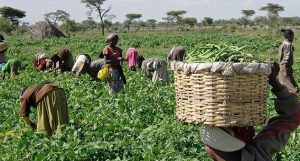
One of the major factors that retard economic growth and well-being of Nigerians is the inability of the country to grow enough food to carter for its citizens and also to export to earn foreign exchange. Nigerian farm produce has been variously rejected by international markets, which emphasise on traceability, standard guidelines in packaging and processing of the produce. In order to enhance food production, African Development Bank (AfDB) has introduced strategies to boost agriculture in Nigeria, writes Chinedu Eze.
In order to address Nigeria’s $4.9 billion annual food security challenge, the African Development Bank has introduced Special Agro-Industrial Processing Zones (SAPZ) project to boost agriculture in Nigeria with the objective that the country will produce enough food for its citizens and also export to earn foreign exchange.
There is a correlation between food sufficiency and economic development of any nation. According to International Food Production Research Institute (IFPRI) Africa, food security deteriorated in Africa during the past decade, and the number of undernourished people has been increasing since 2010. The prevalence of undernourishment is now above pre-pandemic levels at 9.7% compared with 7.2% in 2019, and Africa reports the highest level in the world.
The agency noted that external factors, such as the Russia-Ukraine conflict, have contributed to this increase and projections show that almost 600 million people in Africa will be chronically undernourished in 2030. Moreover, Africa is not on track for SDG2 (Sustainable Development Goals) to eradicate hunger by 2030. To achieve food security and reduce the number of undernourished people, many policymakers are advocating for food self-sufficiency. Relying on local production and promoting it through various policy measures, including restrictive trade policies, which appears to many to be a natural solution.
Callistus Orgu in his work, Food Security and Economic Development in Nigeria, observed that the number of people without enough, adequate and safe food to eat on a regular basis remains stubbornly high, at over 900 million (Food and Agriculture Organization (FAO), 2010) and is not falling significantly.
Also, according to a World Food Program estimate, hunger affects one out of seven people on the planet. In 2010, Food and Agriculture Organisation (FAO) estimated that more than one billion of the world’s people did not have enough food to lead healthy and productive lives. Ironically, the highest proportion of the food insecurity live in rural areas where food is produced, yet they are net food buyers rather than food sellers. Over 60% of the world undernourished people live in Asia, and a quarter in Africa.
The latest FAO figures indicate that there are 22 countries, 16 of which are in Africa, in which the undernourishment prevalence rate is over 35 per cent. Achievement of food security in any country is typically an insurance against hunger and malnutrition, both of which hinder economic development. This is why all developed and some developing countries make considerable efforts to increase their food production capacity. Approximately one billion people worldwide are undernourished, many more suffer from micronutrient deficiencies, and the absolute numbers tend to increase further, especially in Sub-Saharan Africa (FAO, 2008), as the World Bank proposed a definition of food security which remains current today.
AfDB Intervention
There is now a new dawn for Nigerian agriculture as Special Agro-Industrial Processing Zones (SAPZ) implementation takes off in Kaduna and Cross River states. According to AfDB, Nigeria is set to revolutionize its agricultural landscape as construction begins on the SAPZ project—a flagship initiative of the African Development Bank Group’s Feed Africa strategy.
Kaduna and Cross River States will lead this agricultural transformation, marking a pivotal shift in Nigeria’s approach to agribusiness and food security. So, the Federal Government of Nigeria, in strategic partnership with the African Development Bank Group and key international partners—the Islamic Development Bank, International Fund for Agricultural Development, and Africa Grow Together Fund—inaugurated Phase 1 Implementation of the SAPZ programme.
This represents a bold step toward comprehensive agro-industrial development across the nation. Vice President H.E. Kashim Shettima and African Development Bank President Dr. Akinwumi Adesina led this transformative initiative and officially unveiled construction in Kaduna and Cross River.
With an unprecedented investment of $538 million, SAPZ Phase 1 stands as African Development Bank’s largest program in any African country to date. The official ground breaking ceremonies held are on April 8 in Kaduna State and April 10 in Cross River State, was a timely intervention as Nigeria confronts mounting food insecurity challenges and seeks economic diversification.
Public-Private Partnership
So, African Development Bank has pushed for the adoption of Private-Public Partnership (PPP) model to drive sustainable development and this initiative embodies President Tinubu’s commitment to boosting food security, creating sustainable employment, and revitalizing peri-urban economies through innovative public-private partnerships.
AfDB believes that leading private sector partners will spearhead the design, development, and operation of these zones, establishing a blueprint for sustainable agro-industrial growth.
The launch of SAPZ will catalyse momentum for SAPZ Phase 2, with 28 additional states already positioned to join this agricultural renaissance.
African Development Bank recalled that the bank raised an unprecedented $2.2 billion dollars commitment at the recent Africa investment forum in Rabat, Morocco for the Nigeria Phase 2 SAPZ and it believed that the lessons learnt from Phase 1 will lead to a faster implementation of this next phase.
“This initiative embodies President Tinubu’s commitment to boosting food security, creating sustainable employment, and revitalizing peri-urban economies through innovative public-private partnerships. Leading private sector partners will spearhead the design, development, and operation of these zones, establishing a blueprint for sustainable agro-industrial growth. The launch will catalyse momentum for SAPZ Phase 2, with 28 additional states already positioned to join this agricultural renaissance,” AfDB said.
Rural prosperity
With Nigeria losing billions annually to food insecurity, the SAPZ initiative represents both a developmental priority and an economic imperative. The programme aims to transform Nigeria into a global agribusiness leader by strategically leveraging co-financing and private-sector expertise.
According to Adesina, “The Special Agro-Industrial Processing Zone is about developing new economic zones across Africa close to where farmers are. These zones have enabling infrastructure—power, water, roads, irrigation—and today, we’re investing over $3 billion in more than 11 countries, including Nigeria.”
He emphasised that transformation without an agricultural revolution is incomplete because “agriculture touches people’s lives at the grassroots level”.
Adesina commended Kaduna and Cross Rivers state governors for their unparalleled commitments to agriculture, citing that Governor Uba Sani had increased the State budget allocated to agriculture to 10 per cent – about N74 billion committed to agriculture in 2025.
He added that Cross River State also has a significant role in Nigeria’s agricultural transformation because of the vast production of cocoa, cassava, rice and banana in the state, saying Obudu Cattle Ranch alone can turn the state into a huge livestock producer.
With joy, the AfDB president said that the development of the Special Agro-Industrial Processing Zones is finally a reality in Nigeria under the government of President Bola Ahmed Tinubu.
“Because this was an idea that I had when I was the Minister of Agriculture in Nigeria. At the time, it was called Staple Crops Processing Zones. I remember the rice revolution across northern Nigeria at the time and the dramatic improvement in the production of food, more generally, across all the agricultural value chains. The challenge was, we were producing more than we could process. Food losses were high due to lack of appropriate storage and logistics infrastructure. And several agribusinesses were focused more on imports of processed foods, when in fact they should be processing the food and agricultural commodities of Nigeria,” he said.
Changing the Trend
Adesina added that changing that trend required understanding the challenges across the agricultural value chains, from the farm to the table and at the heart of that is the lack of appropriate infrastructure to support food and agribusinesses to take advantage of the rapidly rising staple food crop production, process and add value, and deliver cheaper, processed, well-packaged food for consumers within Nigeria and for export markets.
“Many of the food and agribusinesses were in the urban areas far from the zones of farm production, simply importing raw materials, processing and sending processed imported commodities within the country. The result was the displacement of the emergence of a dynamic food and agribusiness food processing and manufacturing industry that relies on the agricultural commodities produced in Nigeria. This lack of stable industry-driven market offtake for farmers depresses farm prices and negatively affects incentives for farmers to use new technologies, including improved seeds, fertilisers, irrigation and mechanisation.
“While I worked so hard to develop the Staple Crop Processing Zones, with the idea of having them all over the country at the time, institutional inertia from the Ministry of Trade and Investment made their roll-out impossible at the time, with the view that the Ministry of Agriculture should simply focus on ‘farm production’ while the Ministry of Trade and Investment focuses on ‘agribusiness’,” he said.
Notwithstanding the disappointment of not getting the Staple Crop Processing Zones initiative off the ground in Nigeria some 10 years ago, his becoming the president of AfDB offered a bigger opportunity with the Feed Africa Strategy that has committed over $934 million for the development of SAPZs and mobilised co-financing of over $938 million from partners, including the Islamic Development Bank and the International Fund for Agriculture Development (IFAD).
Currently, the Special Agro-Industrial Processing Zones are under implementation in 27 sites across 11 countries, including Cote d’Ivoire, Senegal, Guinea, Liberia, Madagascar, Togo, Ethiopia, Democratic Republic of Congo, Mozambique, Mali, and now, Nigeria. To ensure the success of the programme, The AfDB president called for enablers that include political will, consistent policies that are devoid of flipflops that come with a change in administration, cross-ministerial cooperation and collaboration, legislative backing for the SAPZs through an Act of the National Assembly, while the Bank of Industry, recapitalised Bank of Agriculture and commercial banks, ensure affordable financing for agricultural value chains.
Comprehensive Development Strategy
The SAPZ Nigeria Program delivers a three-pronged approach, which include infrastructure development for agro-industrial zones; institutional capacity building and business environment enhancement and agricultural productivity support, skills development, and private investment facilitation across value chains.
These zones are strategically established in high agricultural potential areas, equipped with robust infrastructure and common services, and supported by tailored policy incentives to seamlessly integrate agricultural and industrial businesses.
By clustering agro-processing activities within areas of high agricultural advantage, these zones bring together producers, processors, aggregators, and distributors within spheres of comparative advantage, reducing transaction costs while driving productivity and enterprise development.
A welcome development
Speaking on Thursday when he performed the ground breaking ceremony of SAPZ in Calabar, the Vice President, Kashim Shettima, described the project as “a game changer” that aligns with the President Tinubu administration’s Renewed Hope Agenda, aimed at diversifying the nation’s economy, addressing food security, tackling rural unemployment, as well as empowering farmers and the youth population.
“There is no intervention more practical in our dream of a nation where the potential of agriculture is maximised than what’s brought us together today. This isn’t just a project—it’s a bold vision to transform Nigeria’s agricultural value chain,” Shettima said.
The VP added that the Kaduna and Calabar SAPZ will serve as a hub for agro-processing and storage, providing farmers and agripreneurs with critical infrastructure to scale their operations and tap into local and international markets.
“This is where farmers will meet with private investors, where ideas will turn into enterprise, and where our youth will find meaningful opportunities,” he said, disclosing that the Tinubu administration has classified SAPZ as a priority program in Nigeria’s quest for food security, with plans to institutionalise it as a government agency that will facilitate agricultural industrialisation across all 36 states.

Earlier, Cross River State Governor, Bassey Otu, said the programme marked a watershed in the ongoing bid by his administration to establish the renewable resource base of the state through the full utilisation of agriculture and its multiple value chain.
Otu pointed out that in Cross River State, establishing a cluster of smallholder farmers in cash crops such as rice, cassava, millet, and cocoa across the state is the right step towards the agro-industrial revolution.
He said the paradigm shift from a non-renewable to a renewable resource base also holds the key to the prosperity of many nations, hence the imperative to join the league of sub-nationals in Nigeria that have adopted agriculture as the mainstay of their economy.
Also, Minister of Agriculture and Food Security, Senator Abubakar Kyari, said the programme would transform Nigeria’s agricultural production and agro-investment landscape under the Renewed Hope Agenda of President Tinubu. The Association of Food and Agro Processors of Nigeria (AFAP) said the feat marked the beginning of a journey filled with promise, progress, and purpose in the food and agro-industries in Nigeria.
“This project symbolises vision, collaboration, and commitment to building Nigeria’s sustainable and agricultural-based economy. It is also a testament to what is achievable when minds come together with a shared dream and vision,” the associate stated.
Indeed, the SAPZ initiative, which thrives on partnership based on counterpart funding model, promises to systematically turn around the slumbering agriculture sector. Though Adesina’s two-term tenure at the AfDB ends soon, Nigerians and development partners look forward to SAPZ facilities that will outlast the current federal and state administrations.






